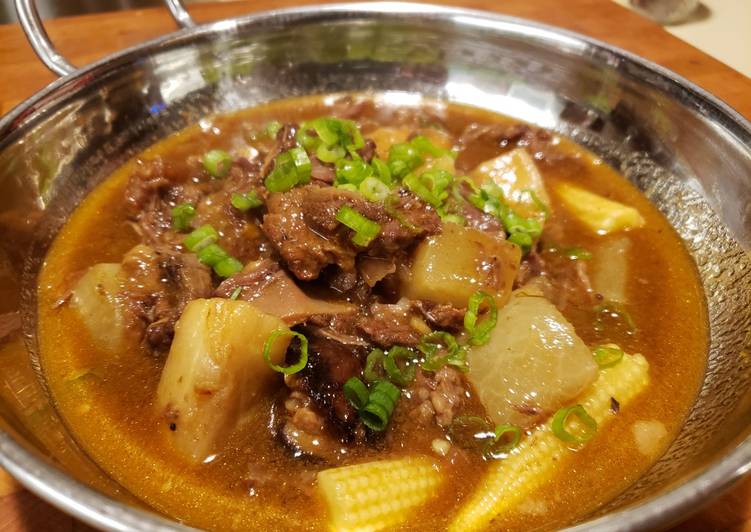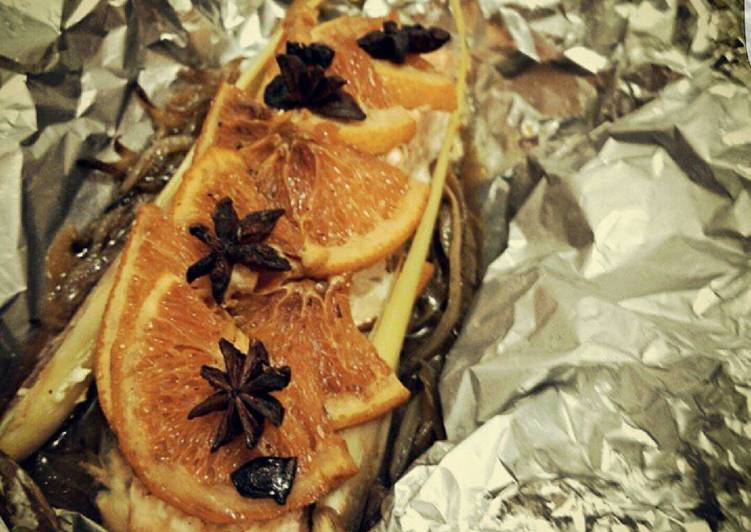
Hey everyone, I hope you’re having an amazing day today. Today, we’re going to prepare a distinctive dish, pressure cooker chinese beef rib and tendon stew. One of my favorites food recipes. This time, I’m gonna make it a little bit unique. This is gonna smell and look delicious.
Pressure Cooker Chinese Beef Rib and Tendon Stew is one of the most favored of recent trending foods on earth. It is enjoyed by millions every day. It’s simple, it is fast, it tastes yummy. Pressure Cooker Chinese Beef Rib and Tendon Stew is something that I have loved my whole life. They are nice and they look wonderful.
To get started with this recipe, we must prepare a few ingredients. You can have pressure cooker chinese beef rib and tendon stew using 22 ingredients and 18 steps. Here is how you can achieve that.
The ingredients needed to make Pressure Cooker Chinese Beef Rib and Tendon Stew:
- Prepare 2-3 lbs beef short ribs
- Make ready 1 lb beef tendon
- Take 1 Tbsp oil
- Prepare 3 shallots, sliced
- Prepare 4 cloves garlic, minced
- Take 5 spring onions
- Prepare 4 inch ginger, peeled & sliced
- Get 1 Tbsp shaoxing wine
- Prepare 2 cups chicken stock
- Take 3 Tbsp chu hou paste
- Get 1 Tbsp soy sauce
- Prepare 1 Tbsp dark soy sauce
- Make ready 2 tsp oyster sauce
- Get 2 tsp sugar
- Take 3 whole star anise
- Get 5 inches orange peel
- Prepare 1.5 lbs daikon, peeled and cubed
- Prepare 3 parsnips, peeled and cubed
- Get 5 oz shitake, sliced
- Make ready 1 can baby corn
- Get 4 Tbsp water
- Get 4 Tbsp corn starch
Instructions to make Pressure Cooker Chinese Beef Rib and Tendon Stew:
- Place the beef tendon in the pressure cooker and add 1 cup water. Pressure cook on high pressure for 1 hour and 15 min and natural pressure release.
- While the tendon is cooking, prepare the other ingredients.
- Lay the short ribs out on a baking sheet and season with salt and pepper.
- Separate the green from the white parts of the spring onion. Add the white parts to a small bowl and then prep the garlic, shallot and ginger into the bowl.
- Peel and cube the daikon and parsnips, and rough slice the shitake and add to a large bowl.
- In a small dish add the chu hou paste, soy sauces, oyster sauce, sugar, star anise and orange peel.
- When the tendon is done cooking, pour the cooking liquid out, and rinse the tendon under cool water. Cut the tendon into bite size pieces.
- Preheat the oven broiler to high. Broil the short ribs for 5 minutes until they are seared and browning.
- In the cleaned out pressure cooker heat the oil with the saute function. Add the onions, shallot, garlic and ginger. Cook until they begin to brown and stick to the bottom of the pan and then add the shaoxing wine.
- After the shaoxing has deglaze the bottom of the pan, add the stock and the chu hou mixture. Stir to distribute.
- Layer in the short ribs and cubed tendon. Add the daikon, parsnip and mushroom on top.
- Pressure cook on high pressure for 10 min
- Quick release the pressure. Drian the baby corn and add it to a bowl.
- Remove the daikon and parsnips and place on top of the baby corn. Leave this aside to stay warm.
- Replace the lid on the pressure cooker and cook on high pressure for another 20 min
- Let the pressure naturally release. Remove the lid and pick out the rib bones.
- Combine the starch and water into a slurry. Bring the stew to a simmer and add the slurry while stirring a little at a time until it thickens to your level of choosing.
- Add the reserved vegetables and mix. Dice the green stems of the onions for garnish.
So that is going to wrap it up with this special food pressure cooker chinese beef rib and tendon stew recipe. Thank you very much for reading. I’m sure you will make this at home. There’s gonna be interesting food in home recipes coming up. Remember to bookmark this page in your browser, and share it to your loved ones, friends and colleague. Thanks again for reading. Go on get cooking!


